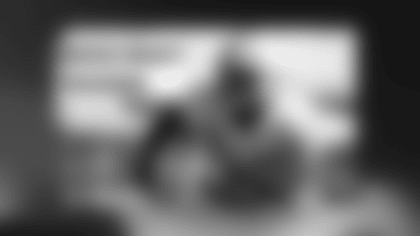BB: It seems like last year that we played the Dolphins, but it really was this year. This is a team that's a lot different than the team we saw earlier in the season - not just their record, but I'd say overall the way that they play, the way they do things. They've been very impressive. They're strong in all three phases of the game. Their defensive line is a huge force, got a lot of turnovers, a lot of interceptions. They've really improved in the red area and on third down, obviously; very good in that area and particularly in some of the shorter distances which are usually the easier ones to convert, but not against them. The kicking game is very explosive; blocked kicks, return kicks; three scores on special teams. A very good unit; a lot of good core players; a couple of the league leaders in tackles with [Mike] Hull, [Michael] Thomas; [Walt] Aikens does a great job from them. The specialists have been good. Big kicks for [Andrew] Franks last week; [Matt] Darr has had a good year; [John] Denney, of course, so they're very good there. Offensively, it's a very explosive unit. A lot of big plays; running game, passing game; the receivers are all big-play players. Obviously, [Jarvis] Landry had a big day against us; [Kenny] Stills, [DeVante] Parker, those guys are - Parker had a big day against us, too. Parker, Stills, all those guys are tough to handle, plus all the running backs. [Jay] Ajayi gets a lot of credit and he deserves it. [Kenyan] Drake, [Damien] Williams, they've got a lot of depth at that position. The quarterbacks have played well. They've kind of juggled things around a little bit on the offensive line, and that group seems to have come together and solidified. [Dion] Sims has given them some solid play at tight end as he did before. It's a good football team. [They do] a lot of things well. They have good field position because of the kicking game, good on defense and very explosive on offensive. We've got a lot of work to do. Hopefully we can go down there and play more competitively than we have in some more recent trips.
Q: How would you describe the style and type of runner that Jay Ajayi is?
BB: Well he describes his style as angry, so I wouldn't disagree with that.
Q: When he was coming out of college he was selected in the fifth round of the NFL Draft, but some thought he had traits that would have led him to have been selected in a higher round.
BB: Yeah, I mean obviously if any of us could redo that draft over again it wouldn't be in the fifth, just like [Tom] Brady wouldn't be in the sixth. We're more focused on today than trying to relive the past.
Q: What have you seen from Joe Thuney and the improvements that he's made to be able to get to where he is?
BB: Joe [Thuney] is smart. Joe works hard. He's here every day. He's been here - I don't think he's missed a day all spring, summer. He just shows up every day and goes to work, a lunch-pail guy. Just grinds it out, and he's smart. He takes coaching well, understands what we're doing. Good communication on the line with David [Andrews] and Nate [Solder] on his side, but the whole group.
Q: How important has it been to have consistency from Devin McCourty and Patrick Chung week after week?
BB: Yeah, Duron [Harmon], too. It's really all three of those guys because a lot of times, all three of them are on the field together in different roles. [Patrick] Chung's role changes; Devin [McCourty] and Duron are usually at the safety spot. It's been great. It's huge, they're good players and they have good communication. They work well together in terms of disguises and they work well with their teammates whether it be the defensive ends, linebackers, the nickel back and so forth, and the corners. So communication and that is good, but they're good players. They can run, they cover the deep part of the field good and they're pretty consistent tacklers. That's a really good group.
*Q: How important has the fullback position been for your team despite the idea that it might be underrated to some other teams? *
BB: Well I think it's a little bit of a style thing. Most teams have one running back in the game, so there might be more than one back, but usually one guy who primarily carries the ball, and then that other player is a fullback or he's a tight end. I don't want to say he has the same role, but he's a blocker. Put him in the backfield, then you have the ability to usually - well you can put him on either side of the play. You can put him on the strong side, you can put him on the weak side, if he's on the line of scrimmage, you can't. If he's a tight end off the line of scrimmage you can bring him across. It's a little further to go, you have less blocking angles, but you have a little bit of flexibility to do that, so I think it's a matter of where you want that guy, and then the closer he is to the line of scrimmage, the more potential he has to be involved in the passing game. There's a little bit of a tradeoff between having a guy up on the line and being in a one-back set to have more receivers be able to enter the defense quicker versus having him in the backfield where you have more blocking angles, more scheme possibilities, and a little bit longer to get that player into the passing game.
Q: Is it more difficult to make those blocks than people think from afar?
BB: Yeah, the hard part about that position is dealing with what's in front of you. A lot of times, the way a play is drawn up on paper isn't the way it happens. Guys move and blocks that should be made cleanly in front of you aren't clean and there's another body or half a body that's in the way, and do you take that guy instead of the guy you're supposed to block or do you go around him and let him penetrate? When there's too much penetration you have to take him, when there's not enough penetration, then the running back can get by him and you still go to your player, and then of course sometimes that changes. The guy you were blocking moves and stunts and somebody else is there and you have to figure it out on the run. There's a lot more of that from the fullback positon than there is on the line of scrimmage. There's some of that on the line of scrimmage, but more of that at fullback.
Q: Are there rules on that?
BB: Yeah, absolutely. I mean, you have an assignment and provided everything goes the way it should go, then you get to that assignment. But when things happen, then you have to make an adjustment and do what's the best thing for that play. It's no different than if a quarterback has a free rusher coming on. The guy might have missed his guy or the guy might have been supposed to block him but he didn't block him, so now what do you do? Do you throw it away, do you have a chance to throw it to an outlet, do you take a sack and not lose possession of the ball? Sometimes you have to make those kinds of decisions when the play doesn't go quite the way it's supposed to.
Q: How difficult is it for the fullback just to execute a block given all of the adjustments that could happen in front of him?
BB: Well, I mean that's the job. That's the job. It's like a linebacker sorting it out on the other side of the ball. 'Here is where my gap is supposed to be but something happened and I can't go there. My guy got knocked into it,' or what have you. I'd say the hard part is you don't see college teams using fullbacks very much so there's no real training for them. A lot of the fullbacks in the NFL like James [Develin] were defensive conversions or there are some circumstances around that position. They didn't grow up as a fullback and play fullback their whole life like David Andrews played center his whole life or Elandon Roberts played linebacker his whole life. These guys have to make a conversion. Sometimes that's challenging but I'd say that's challenging for the whole league because, again, when you look at the fullbacks in the league, I want to say the last time I did it, like half of them weren't fullbacks initially. They were something else.
Q: How do you feel James Develin has done with the workload you've asked him to handle recently?
BB: Good. He loves to play. Yeah, he's happy to go in there. He's done a good job for us on the punt team, the kickoff return team, he's played for us in the kicking game, a very dependable player. James [Develin] is strong. He's not big like a lineman but he's got very good playing strength for his size. I'd say he's built to last. He's got a strong body and he can take contact and he can give it out, too. He's tough. He's got a good mentality. He likes contact. He seeks it out, but he's changed up his techniques and as he's played more guys have kind of played him differently. There are some things he's had to deal with this year that maybe he didn't have to deal with - he didn't play too much last year - but two years ago from a technique standpoint. He's adjusted and adapted to that. He's done a good job.
Q: Is it helpful to the secondary to have played together for a long time, even going back to college, and likewise being so close and friendly off the field?
BB: I think that's a big plus, just to be able to - in the end whether you're fighting in a war or you're fighting on the football field, you're really fighting for the guy next to you. That's really what the tightest bond is, the biggest motivation is, is to not let the guy beside you down. Those relationships, all of those things that go into teamwork and teammates are very important in team building. Certainly there's talent and execution and all of that is involved, and then the communication. I mean a lot of times it happens to coaches, too. You're out of the office, you're doing something and something comes up and you end up talking about a play or whatever. I think it's the same thing with players. They're in a social setting or whatever and something comes up like 'Hey, what do you think about this?' That kind of trust, communication and love for your teammates, and again, wanting to be unselfish and play for your teammates is a huge part of any team.
Q: You mentioned some players have played the same position their whole life. Is that a rare thing or something that you seek out and view as a positive in the evaluation process?
BB: No, I just think it is what it is. I mean look, a lot of defensive players get moved to offense because they're not good enough on offense, right? High school coaches, college coaches, if they have somebody better and you have another good player at that position, instead of stacking them up you just move them somewhere where he can get on the field quicker. If you're a high school or college coach you're not going to take your best running back and put him at - I mean it'd be rare to put him somewhere else. You're going to give him the ball and let him be a productive scorer for you. Most of those guys do get moved and most of the offensive linemen get moved from defense because they don't run well enough. If they ran better they probably would play on defense because those guys are hard to find. So to see those players offensively that can run a four-nine, five-flat [40-yard dash] at those kinds of weights, most of them are first, second-round left tackles. That's where most of them show up. That's a premium position on offense so if you have that kind of an athlete you probably either play him on defense or you play him at left tackle. That's where they go. Do they get moved? I mean I don't think you move a defensive lineman to the offensive line unless you're either going to move him to left tackle or, again, you have so many defensive lineman that you can afford to move him. Usually you move them because they don't run well enough and offensively you move them because you have other guys that can catch the ball better, or more elusive runners, or more productive playmakers and then they move. Sometimes some guys find their spot right away and they stay in it. That's a general statement. It's not meant towards any specific player. Although I think most of the defensive players need to understand that the reason they don't play offense is because they're not good enough to play offense.
Q: Do you have any memories of coaching against longtime special teams coach Bruce DeHaven who passed away just recently?
BB: Did he pass away? Yeah, Bruce [DeHaven] is a great guy. He's one of the real good guys. I never worked with him, but yeah, he was always one of the - I mean when I came in there were no special teams coaches really to speak of and then he was one of the, I'd say, first wave of lifers kind of at that position. I mean guys like [Dick] Vermeil and those guys, but they didn't really last very long as special teams coaches. They moved to somewhere else or they coached special teams and another position; [Jerry] Glanville or guys like that. Yeah, Bruce was - that's sad. I always enjoyed seeing him. Fortunately we didn't play against him, well we played against him, but more recently not so much so it was a better relationship to compete against him.
Q: Coach DeHaven was involved in some memorable special team's plays as a coach, one being the onside kick recovery in Buffalo's comeback versus the Houston Oilers in the Wild Card round of the 1992 season.
BB: Yeah, I mean it was a signature play; no doubt about it. I think those plays always, when you see those plays, whether it was the [Dontari] Poe pass or the special teams player in some kind of unusual onside kick or whatever it is, fake field goal that works. I mean those plays always kind of stick out. It's nice to have one of those in your resume if you can pull it off. But I think the more important thing is just the week-in and week-out consistency and performance of the unit.
Q: Is there something that makes a special teams coach like Bruce DeHaven be able to have success on six or seven different coaching staffs like he has?
BB: I don't know, how many have I been on? Seven? Eight? I don't know. I'm losing count here.
Q: His teams were always great on special teams no matter which stop he was at. What's the secret to that?
BB: Probably good coaching. I mean obviously good players, too. I mean you could say the same thing about Wade [Phillips]. Everywhere that Wade's been - Buffalo, Dallas, Denver a couple of times - he plays the same system and they play good. It's obviously having a good system and getting the right players for it and getting them to believe in it and understand it.
Q: Would you put Doug Flutie's drop kick as a Patriot in the 2005 season up there amongst memorable plays on special teams?
BB: Yeah, it didn't really mean anything.
Q: It was a signature play.
BB: Definitely a signature; yeah. Two plays - the drop kick and the Hail Mary, right? See if you can work that into the epitaph somewhere.






































